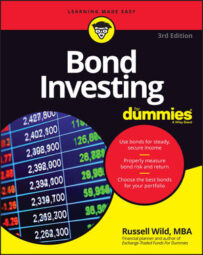It’s important to understand how tax law affects your retirement accounts, while investing and while withdrawing. The Internal Revenue Service, in cahoots with Congress, gives the U.S. investor two basic kinds of tax-advantaged retirement accounts:
Plans that allow for the deferral of income tax until the money is withdrawn (IRAs, SEP-IRAs, 401k plans)
Plans that, provided you follow certain rules, allow for tax-free withdrawals after reaching age 59-1/2 (Roth IRAs, Roth 401k plans)
Minimize income to lower your taxes
Interest payments from bonds or bond funds (other than municipal bonds) are generally taxable as normal income. In contrast, the money you make off stocks, whether dividends or capital gains, is usually taxed at 15 percent (although this rate is always subject to change). It makes sense, especially if you are in a tax bracket that’s higher than 15 percent, to keep your bonds in a tax-advantaged retirement account.
Even if you are in the 15 percent bracket, this plan still makes sense because bond income, regular and steady, is taxed regardless of whether you withdraw it or not. Stock appreciation (capital gains) is taxed only when you sell, although stock held in mutual funds may incur capital gains when the fund sells, even if you don’t.
When allocating your portfolio, keep in mind that money in your 401(k) or IRA will eventually be taxed as regular income. Say you decide that you want a 30 percent allocation to bonds, and all of those bonds are in your IRA. If you are within four or five years of withdrawing some of that money, you may want to make the actual allocation of bonds somewhat higher.
If you have various retirement accounts with more space than you need for just your bond allocation, put the bonds in the tax-deferred accounts and put potentially higher-yielding assets, like stocks, in your tax-free accounts, such as your Roth IRA.
That’s because the Roth IRA does not require you to start taking minimum required distributions at age 70-1/2, so you may as well fuel up your Roth with assets that can really grow over the years.
Lower your tax bracket through smart withdrawals
At age 70-1/2, you have to start taking something from your 401(k) or your regular or rollover IRA; it’s the law. But prior to that age, and to a certain degree after that age, whether your cash comes from your 401(k), IRA, Roth IRA, or taxable account is up to your discretion.
How to best use that discretion?
Balance, Grasshopper, balance. Most likely, you want to pull from your tax-deferred retirement accounts only to the point that doing so doesn’t push you into a higher tax bracket. At that point, supplement that cash with money from your Roth account or your taxable brokerage account.
For example, if you are a single guy or gal withdrawing $40,000 a year from your portfolio, you most likely want to take at least the first $8,700 of that amount from your 401(k) or traditional IRA. You’ll be taxed only 10 percent on that money. You may want to consider taking as much as $35,350 from one of these accounts.
That amount (according to the 2012 federal tax schedule), and no more, will keep you squarely in the 15 percent tax bracket. Show any more incremental income, and you’ll be taxed at 25 percent — a two-thirds increase in tax! Solution: Withdraw the remaining $4,650 ($40,000 – $35,350) from either your Roth or your taxable brokerage account, and you’ll keep yourself in the 15 percent bracket.
Having retirement money that is both taxable and tax-free is known in the financial planning world as tax diversification. It makes a lot of sense.
Caveat: If you have mucho bucks — more than the federal estate tax exemption (which varies year to year) — the rules change. Your heirs will generally fare much better inheriting money outside of your IRA or 401(k) than money within.
It may make sense, in your case, to well exceed your minimum required distributions, take the tax hit, but spare your heirs from having to pay a hefty estate tax plus income tax. Talk to an estate planning attorney, tax accountant, or financial planner before setting up your withdrawal strategy.
Oh, and Roth money is a great gift for your heirs.

